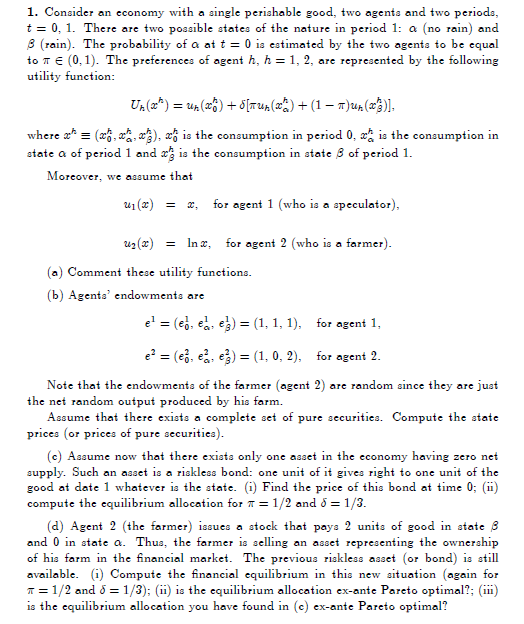
1. Consider an economy with a single perishable good, two agents and two periods, t = 0, 1. There are two possible states of the nature in period 1: a (no rain) and 8(rain). The probability of a at t = 0 is estimated by the two agents to be equal to T (0.1). The preferences of agent h, h = 1, 2, are represented by the following utility function: UA (2") = u() + [Tun (**+ (1 - T)u(2)], where * = (25.2.2), is the consumption in period 0, is the consumption in state a of period 1 and is the consumption in state 8 of period 1. Moreover, we assume that (6) = for agent 1 (who is a speculator), 29(20) = lns, for agent 2 (who is a farmer). (a) Comment these utility functions. (b) Agents' endowments are et = (eb, en e) = (1, 1, 1), for agent 1, e = (eg, eg e) = (1, 0, 2), for agent 2. Note that the endowments of the farmer agent 2) are random since they are just the net random output produced by his farm. Assume that there exists a complete set of pure securities. Compute the state prices (or prices of pure securities). (c) Assume now that there exista only one asset in the economy having zero net supply. Such an asset is a riskless bond: one unit of it gives right to one unit of the good at date 1 whatever is the state. () Find the price of this bond at time 0; (i) compute the equilibrium allocation for T = 1/2 and 5 = 1/3. (d) Agent 2 (the farmer) issues a stock that pays 2 units of good in state 8 and 0 in state a. Thus, the farmer is selling an asset representing the ownership of his form in the financial market. The previous riskless asset (or bond) is still available. ) Compute the financial equilibrium in this new situation (again for 1=1/2 and 5 = 1/3); (i) is the equilibrium allocation ex-ante Pareto optimal?; (in) is the equilibrium allocation you have found in (c) ex-ante Pareto optimal? 1. Consider an economy with a single perishable good, two agents and two periods, t = 0, 1. There are two possible states of the nature in period 1: a (no rain) and 8(rain). The probability of a at t = 0 is estimated by the two agents to be equal to T (0.1). The preferences of agent h, h = 1, 2, are represented by the following utility function: UA (2") = u() + [Tun (**+ (1 - T)u(2)], where * = (25.2.2), is the consumption in period 0, is the consumption in state a of period 1 and is the consumption in state 8 of period 1. Moreover, we assume that (6) = for agent 1 (who is a speculator), 29(20) = lns, for agent 2 (who is a farmer). (a) Comment these utility functions. (b) Agents' endowments are et = (eb, en e) = (1, 1, 1), for agent 1, e = (eg, eg e) = (1, 0, 2), for agent 2. Note that the endowments of the farmer agent 2) are random since they are just the net random output produced by his farm. Assume that there exists a complete set of pure securities. Compute the state prices (or prices of pure securities). (c) Assume now that there exista only one asset in the economy having zero net supply. Such an asset is a riskless bond: one unit of it gives right to one unit of the good at date 1 whatever is the state. () Find the price of this bond at time 0; (i) compute the equilibrium allocation for T = 1/2 and 5 = 1/3. (d) Agent 2 (the farmer) issues a stock that pays 2 units of good in state 8 and 0 in state a. Thus, the farmer is selling an asset representing the ownership of his form in the financial market. The previous riskless asset (or bond) is still available. ) Compute the financial equilibrium in this new situation (again for 1=1/2 and 5 = 1/3); (i) is the equilibrium allocation ex-ante Pareto optimal?; (in) is the equilibrium allocation you have found in (c) ex-ante Pareto optimal







